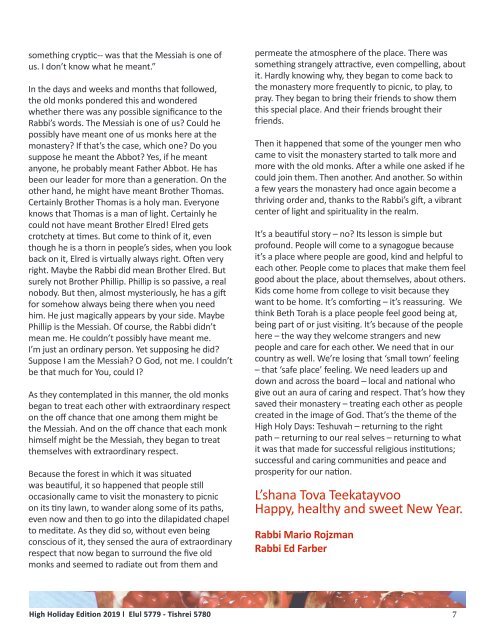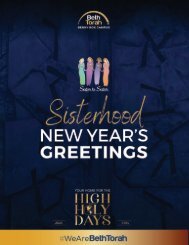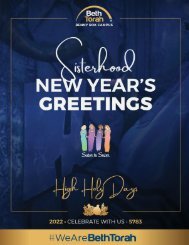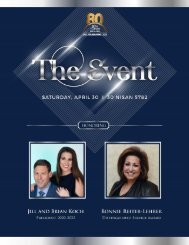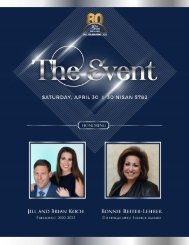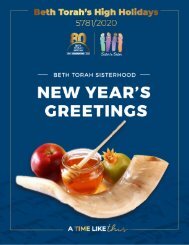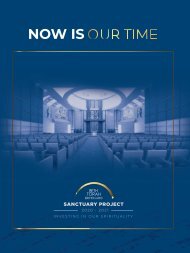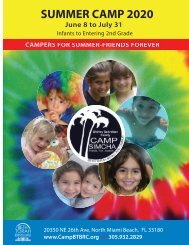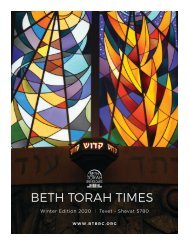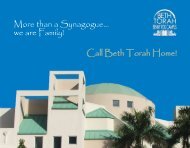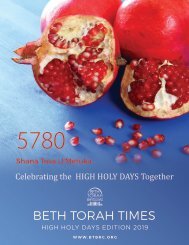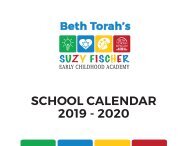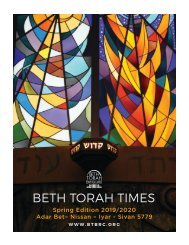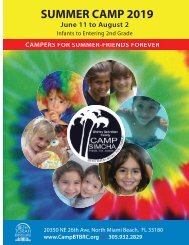BETH TORAH TIMES - HIGH HOLY DAYS EDITION 2019/5780
You also want an ePaper? Increase the reach of your titles
YUMPU automatically turns print PDFs into web optimized ePapers that Google loves.
something cryptic-- was that the Messiah is one of<br />
us. I don’t know what he meant.”<br />
In the days and weeks and months that followed,<br />
the old monks pondered this and wondered<br />
whether there was any possible significance to the<br />
Rabbi’s words. The Messiah is one of us? Could he<br />
possibly have meant one of us monks here at the<br />
monastery? If that’s the case, which one? Do you<br />
suppose he meant the Abbot? Yes, if he meant<br />
anyone, he probably meant Father Abbot. He has<br />
been our leader for more than a generation. On the<br />
other hand, he might have meant Brother Thomas.<br />
Certainly Brother Thomas is a holy man. Everyone<br />
knows that Thomas is a man of light. Certainly he<br />
could not have meant Brother Elred! Elred gets<br />
crotchety at times. But come to think of it, even<br />
though he is a thorn in people’s sides, when you look<br />
back on it, Elred is virtually always right. Often very<br />
right. Maybe the Rabbi did mean Brother Elred. But<br />
surely not Brother Phillip. Phillip is so passive, a real<br />
nobody. But then, almost mysteriously, he has a gift<br />
for somehow always being there when you need<br />
him. He just magically appears by your side. Maybe<br />
Phillip is the Messiah. Of course, the Rabbi didn’t<br />
mean me. He couldn’t possibly have meant me.<br />
I’m just an ordinary person. Yet supposing he did?<br />
Suppose I am the Messiah? O God, not me. I couldn’t<br />
be that much for You, could I?<br />
As they contemplated in this manner, the old monks<br />
began to treat each other with extraordinary respect<br />
on the off chance that one among them might be<br />
the Messiah. And on the off chance that each monk<br />
himself might be the Messiah, they began to treat<br />
themselves with extraordinary respect.<br />
Because the forest in which it was situated<br />
was beautiful, it so happened that people still<br />
occasionally came to visit the monastery to picnic<br />
on its tiny lawn, to wander along some of its paths,<br />
even now and then to go into the dilapidated chapel<br />
to meditate. As they did so, without even being<br />
conscious of it, they sensed the aura of extraordinary<br />
respect that now began to surround the five old<br />
monks and seemed to radiate out from them and<br />
permeate the atmosphere of the place. There was<br />
something strangely attractive, even compelling, about<br />
it. Hardly knowing why, they began to come back to<br />
the monastery more frequently to picnic, to play, to<br />
pray. They began to bring their friends to show them<br />
this special place. And their friends brought their<br />
friends.<br />
Then it happened that some of the younger men who<br />
came to visit the monastery started to talk more and<br />
more with the old monks. After a while one asked if he<br />
could join them. Then another. And another. So within<br />
a few years the monastery had once again become a<br />
thriving order and, thanks to the Rabbi’s gift, a vibrant<br />
center of light and spirituality in the realm.<br />
It’s a beautiful story – no? Its lesson is simple but<br />
profound. People will come to a synagogue because<br />
it’s a place where people are good, kind and helpful to<br />
each other. People come to places that make them feel<br />
good about the place, about themselves, about others.<br />
Kids come home from college to visit because they<br />
want to be home. It’s comforting – it’s reassuring. We<br />
think Beth Torah is a place people feel good being at,<br />
being part of or just visiting. It’s because of the people<br />
here – the way they welcome strangers and new<br />
people and care for each other. We need that in our<br />
country as well. We’re losing that ‘small town’ feeling<br />
– that ‘safe place’ feeling. We need leaders up and<br />
down and across the board – local and national who<br />
give out an aura of caring and respect. That’s how they<br />
saved their monastery – treating each other as people<br />
created in the image of God. That’s the theme of the<br />
High Holy Days: Teshuvah – returning to the right<br />
path – returning to our real selves – returning to what<br />
it was that made for successful religious institutions;<br />
successful and caring communities and peace and<br />
prosperity for our nation.<br />
L’shana Tova Teekatayvoo<br />
Happy, healthy and sweet New Year.<br />
Rabbi Mario Rojzman<br />
Rabbi Ed Farber<br />
High Holiday Edition <strong>2019</strong> l Elul 5779 - Tishrei <strong>5780</strong><br />
7


